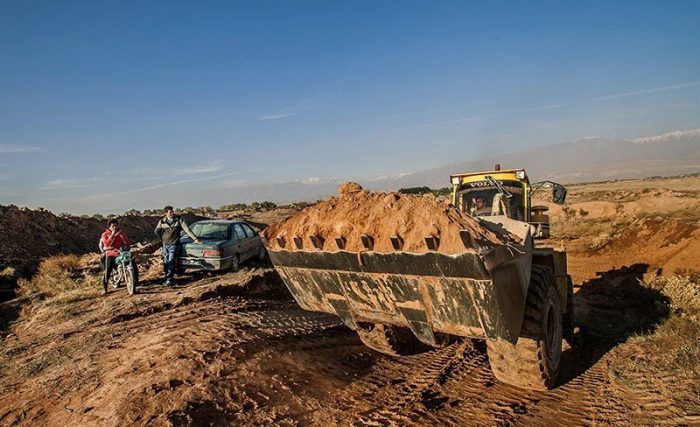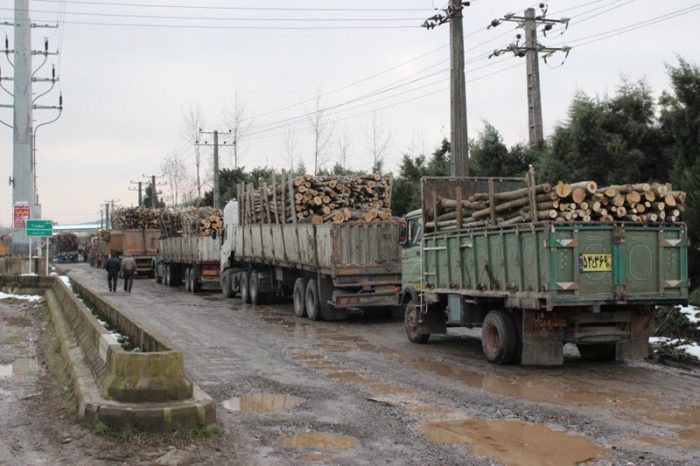
The Iranian regime is trafficking soil and wood in a destructive manor.
Iran’s fertile soil is one of its many natural resources that is being sold off, bit by bit, to foreign countries by the mullahs’ regime to finance its corrupt regime. Hundreds of thousands of tons of Iranian soil are exported to countries in the Persian Gulf each year for the construction of islands. The United Arab Emirates is the primary beneficiary of this exportation, some of which is illegal. Meanwhile, the loss of soil has depleted many formerly-fertile regions of Iran, turning them into deserts and causing the dust storms that now plague the country.
Regime Acknowledges Selling Iranian Soil
Regime officials have confirmed the sale of Iran’s soil to foreign governments. A March 10th article on the Shargh Daily website reported, “Earlier, Iran’s ambassador to Doha said that based on a finalized agreement, the Qatari government will import large amounts of fertile soil from Iran to increase its agriculture output.”
#Iran’s wood and soil trafficked amid government silence https://t.co/x1J89tJwAn
— Iran News Wire (@IranNW) December 16, 2018
Ali Moridi, Chief of the Water and Soil Department in the regime’s Environment Protection Organization told the state-run ISNA news agency on December 15th that Iranian soil is exported to the United Arab Emirates and Qatar.
Moridi said that the primary destinations for Iran’s soil “are Persian Gulf countries, especially UAE and Qatar and in UAE [the soil] is used to create artificial islands and in Qatar to dry the sea.”
On July 27th, the Young Journalist Club said, “In the early 21st century, we had seaports for exporting soil in the Asaluyeh region and the soil was exported to Arabic countries, especially UAE, to create artificial islands.”

Trafficking Iran’s wood
Regime Member of Parliament Nader Ghazipour said that the Ministry of Industry, Mine, and Trade issued a license for the government to export gravel and sand, but “since the gentlemen and officials of the Customs Department don’t assert enough supervision, fertile soil is exported to Persian Gulf states instead of gravel and sand.”
The IRGC-linked Fars news agency quoted Masoumeh Ebtekar, a member of Rouhani’s cabinet, in an August 27th report: “Hormuz Island is one of the beautiful natural attractions of Iran and one of the valuable capacities of the Persian Gulf and unfortunately we’ve witnessed how its soil is trafficked in this region. Therefore, we’ve expressed our concerns in writing a form to the Forests, Range and Watershed Management Organization and the Ministry of Agriculture Jihad,”
Selling Out Iran’s Future
According to reports published last year in Iranian media, soil from Iran is being exported to foreign countries for as little as $35 per metric ton. It takes 600 years for the earth to regenerate soil. Meanwhile, the people of Iran are suffering from the desertification of regions of the country due to the sale of fertile soil by the regime.
Donyay-e Madan, an Iranian mining industry website, wrote in an April 10th article, “Every day, 1,500 metric tons of soil are transported from Chahar Sorkh mine in Kerman to Kongan in Bushehr and then exported from there to UAE.”
Iranian Soil Used to Build Persian Gulf Skyscrapers
Exported Iranian soil is also used for the construction of skyscrapers. On July 23rd, Hamshahri newspaper published an article about this practice. The report, entitled “Neighboring Countries Build Skyscrapers with Smuggled Iranian Soil” described the profiteering involved: “They sell the motherland’s soil and transport it across the sea, package after package, destined for Persian Gulf countries… One of the most famous cases of smuggling Iranian soil to the Persian Gulf countries belongs to Hormuz Island. Red soil which profiteers easily scrape and sell. Aside from mining soil which is sold legally, a significant part of the sold soil which is normal fertile soil has been used to create artificial islands in Arab countries. The same countries which have become tourist attractions for Iranians.”
We seek a non-nuclear #Iran where the death penalty is abolished, ethnic groups enjoy autonomy in the framework of Iran’s national integrity, people enjoy equal economic opportunities and the environment is respected.#IranProtests pic.twitter.com/OgIVtXWygX
— Maryam Rajavi (@Maryam_Rajavi) April 11, 2018
The people of Iran have spent the last year protesting the regime and its corrupt policies. With the help of the MEK and its resistance units, people from all walks of life have risen up to denounce the regime for its mismanagement of the country’s wealth and natural resources, which has led to the economic disaster which is facing the country. The regime is plundering the country down to its very foundations. This will not change until the people demand an end to the tyrannical regime.
Staff Writer
